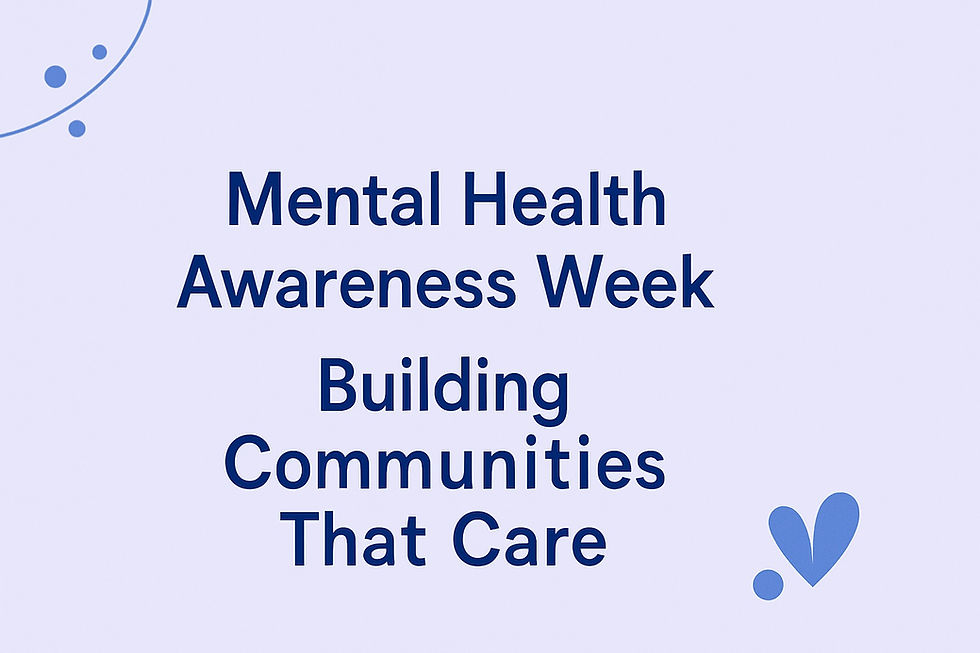Creating Space to Listen: Community, Connection, and Mental Health at Work
- Elevation Occ Psy

- May 14, 2025
- 3 min read

Image Alt text: Digital graphic with the text "Mental Health Awareness Week – Building Communities That Care" on a soft lavender background, featuring abstract blue elements in the corners.
As a business psychologist, I often talk about the intersection of individual well-being and collective culture. But Mental Health Awareness Week is a time to do more than talk — it’s a time to listen, reflect, and act.
This year’s theme, set by the Mental Health Foundation, focuses on building communities that support people living with mental health challenges. It’s a powerful reminder that none of us navigate life alone — and that the communities we create, including our workplaces, can be sources of healing, belonging, and strength
The Workplace Is a Community
We often think of community as something outside of work — neighbours, friends, interest groups. But we spend a huge portion of our lives at work. In many ways, our colleagues become our daily community. Whether we feel safe, supported, and connected in that space can have a significant impact on our mental health.
A healthy workplace community is one where people can:
Speak openly about how they’re really doing
Ask for help without fear of stigma
Offer support without needing all the answers
Know where to turn when things feel heavy
These aren’t “nice-to-haves” — they’re essential to psychological well-being. And they don’t require grand gestures. They begin with the everyday moments: a genuine check-in, a manager making space for honest conversations, or a team culture that values people over performance.
Why Check-Ins Still Matter
We talk a lot about the importance of mental health at work — but how often do we pause to really ask how someone’s doing? Not the passing “you good?” but the meaningful, intentional kind of check-in?
In the busyness of deadlines and deliverables, it’s easy to forget the quiet power of asking, “How are you, really?”
This is the foundation of psychological safety — the feeling that we can show up as we are, be heard without judgment, and still belong. When that safety is present, people don’t just survive at work — they thrive.
Small Actions, Big Impact
As a psychologist working with organisations of all sizes, I’ve seen the impact of micro-actions:
Normalising conversations around mental health in team meetings
Training leaders in empathetic listening and mental health literacy
Encouraging peer support through well-being champions or mental health first aiders
Sharing stories from people across the business — because visibility reduces stigma
And just as importantly, signposting to professional help:
Mind – practical advice and support for mental health
Samaritans – 24/7 emotional support at 116 123
In-house Employee Assistance Programmes (EAPs)
Online resources like Mental Health at Work
We don’t have to be experts to make a difference. But we do need to be present.
Movement, Momentum and Mental Health
Though this year’s official theme also highlights movement — both physical and social — it’s worth noting how movement happens in communities. A healthy workplace community creates the momentum to move toward connection, care, and real change.
So whether you lead a team, work remotely, or are part of a fast-growing organisation, ask:
How does our workplace community support mental health?
Do people feel safe here — to speak up, to rest, to not be okay?
What’s one thing I can do this week to build a stronger sense of connection?
A Final Word
Mental Health Awareness Week isn’t just about awareness — it’s about action. It’s about nurturing a workplace where people don’t feel alone. Where conversations about mental health aren’t awkward or rare, but normal and welcomed.
Because when we build communities that care — at work and beyond — we create environments where people can show up fully, live more freely, and support one another through the ups and downs of life.




Comments